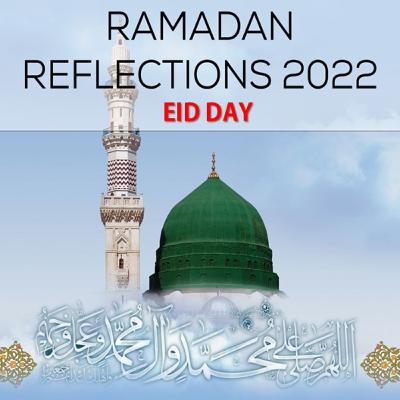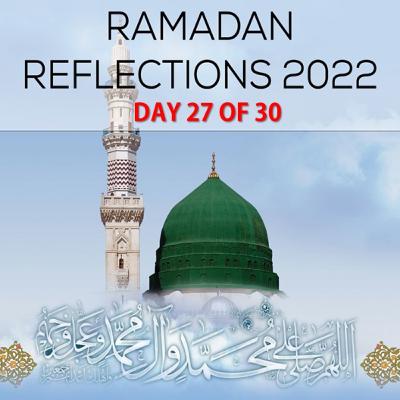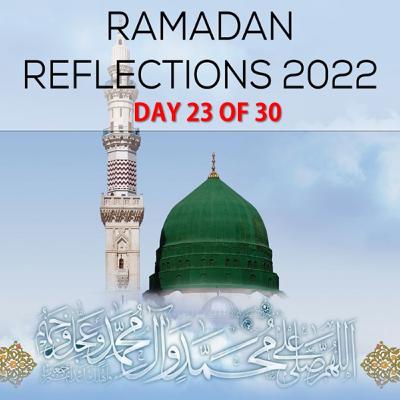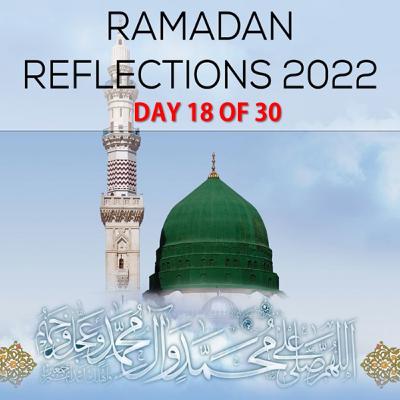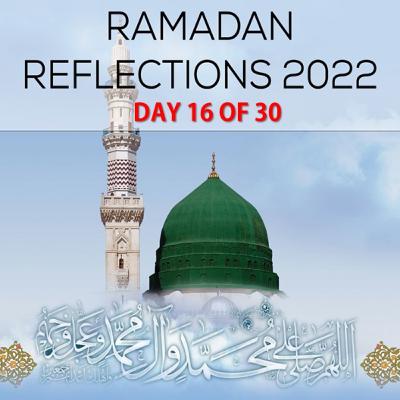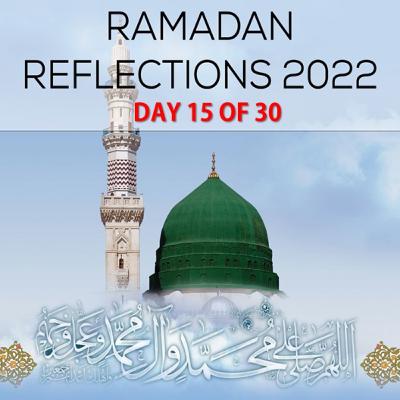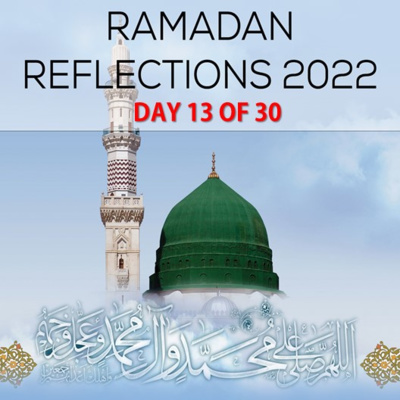Discover Living The Quran Through The Living Quran
Living The Quran Through The Living Quran

Living The Quran Through The Living Quran
Author: QAIM Institute
Subscribed: 232Played: 4,304Subscribe
Share
© QAIM Institute
Description
Become a Paid Subscriber: https://anchor.fm/qaim-institute/subscribe
This is Living The Quran Through The Living Quran - a journey through the Noble Quran to better understand the Word of God.
This is Living The Quran Through The Living Quran - a journey through the Noble Quran to better understand the Word of God.
329 Episodes
Reverse
Allah has guaranteed His final Prophet to have the highest rank in this world and also the next. Not only does he enjoy his own status which Allah grants him, but he is also given the right to intercede. Companions of the Prophet longed to be by his side in this life and craved his company in the world to come. Can we get to a position where we are his neighbours in Paradise? What does Allah have in store for his Beloved Prophet Muhammad?
The Quran makes it clear to Muslims that we are not a cult of personalities. We do not worship people – neither Prophets, Messengers, Imams, nor scholars. We worship Allah. However, as Prophet Muhammad plays such a prominent role in Islam, some people felt that it would be hard to continue on without him – however Allah would remind the Muslims that we must continue – as death will occur to everyone. Do we have a conclusive answer as to what happened to the Prophet? Did he die a “natural death” due to old age? Was it the poison he was given during the event which took place in the Battle of Khaybar? Or did someone else, perhaps someone close to him, force something into his mouth while he was sick and on his death bed in Medina as some hadith have clearly noted? Do we know those people? Do we know their motives? Do we know if they poisoned the Prophet in his last days on this Earth?
The Prophet worked hard for 23-years – in Mecca and Medina – and brought a faith to the Quraysh and the world a ‘new religion’ which would feature teachings such as: Monotheism, Prophethood, and the Day of Resurrection. In addition, he brought the practical rulings of praying, fasting, pilgrimage, charity and many more. Was Islam “complete” and “perfect” with these teachings or was there something else “missing” that had to be declared AGAIN on a MASSIVE SCALE? What happened before the death of Prophet Muḥammad after his farewell hajj in the event known as Ghadeer Khumm?
The Prophet was able to attract people to the message of Allāh based on numerous factors – yes, Allāh ‘changes’ the heart, but at the same time, the character of the Prophet played a huge role in the promotion and progress of Islam. The Messenger had the best morals and etiquette – and how is that not possible when he had the best teacher and nurturer – Allāh. What did he do in his decision-making process and how does Allāh describe this in the Quran? We discuss this role of the Prophet in this episode.
We all commit sins – against ourselves, against others and against Allāh. What is the remedy to remove the effects of the sin and its potential punishment in this life or the next? Simply put it is to turn in repentance to Allāh. But, is repentance ONLY to go to Allāh and ask Him or has Allāh told us to go to His Final Prophet, Muḥammad, and implore him to ask Allāh on our behalf – taking him as an intercessor?
One of the most important acts of worship is not only spoken about in the Quran, but there is an entire chapter named after it – Jumuah – the Friday Prayers. This prayer is unique in that it is an obligation to deliver TWO distinct sermons before the prayer. The form of the prayer also differs from the five daily prayers and so it is meant to be the focal-point for the Muslim community wherever they may be. How would it have been to sit and listen to the Prophet deliver the sermon and how would it have felt to pray this prayer behind him in his Masjid in Medina?
Allāh does not do “acts of worship”, however there is an instance in the Quran in which it seems that Allāh engages in an act which He orders His Angels to perform as well as those who believe – and that is evoking prayers of peace upon Prophet Muḥammad. In reality, when Allāh engages in this act, He is sending down mercy and peace; when He orders the Angels as well as the believers to do this act, He is telling them to make prayers for peace and mercy to be showered upon the Prophet – AND to submit to him unconditionally.
Prophets of Allāh play multiple roles in society – they are not just messengers. Given that the Muslims had left Ethiopia and arrived in Medina, they needed to further develop their theology and one part of that is to know what role Prophet Muḥammad was playing in the religion. For this reason, Allāh gave the Muslims clear guidance as to what Prophets do – and he stated their difficult responsibility in multiple places within the Quran.
As the first contingent of Muslims that had left Mecca and settled in Ethiopia were able to move to Medina, one of the first things that the women of the community began to ask was if anything of the Quran had been revealed specifically addressing women. Being away for so many years, they were genuinely wondering how far had Islam progressed and what had been revealed to the Prophet. When the women found that nothing “specific” addressed them, Asma binte Umays came to the Prophet and discussed this with him and the answer which Allāh provided to her is preserved in the Quran.
Islam looks at the previous Prophets and their messages as being ONE message from the ONE God. Thus, groups such as the Jewish community, Christian community and to an extent others like the Sabians and Zoroastrians were considered as “People of the Book” – having been given messages from Allāh. Whereas they were original messages from Allāh, however, with the coming of the Quran and Prophet Muḥammad, their teachings ceased to be relevant and they were expected to “convert” to the new faith.
The Muslim life in Medina would see many changes in the relationship of Prophet Muḥammad and Imam ʿAlī. The Commander of the Faithful would propose to and eventually marry Fatima al-Zahra, the only daughter of Prophet Muḥammad and would continue to shine by displaying his bravery, courage, skills and many other traits. His status would also be added to by Allāh when he was made the spiritual brother of Prophet Muḥammad – in this world and in the world to come.
As Imam ʿAlī continued to grow and mature, his dedication to Islam and to his spiritual brother, Prophet Muḥammad also grew. The Prophet relied upon Imam ʿAlī in critical junctures of the growth of Islam in Mecca, such as inviting and cooking food for the invitation to the Quraysh to Islam in the event known as Da’wat Dhu’l Asheerah. He also showed his love for Islam and his dedication by sacrificing his life on the bed of Prophet Muḥammad as he left on the migration towards Medina.
There is a relationship which exists between Prophet Muḥammad and Imam ʿAlī which no other companion or family member of the Prophet has. Not only is Imam ʿAlī the cousin and son-in-law of the Prophet, but more importantly, he is his spiritual brother in this world and in the next. He was blessed to marry the only daughter of Prophet Muḥammad and his two sons, Imams Hasan and Husayn would actually be referred to by Allāh in the Quran as the SONS of Prophet Muḥammad. How was their relationship in the early days pre-Prophethood in Mecca?
Although a human being, however Prophet Muḥammad has been given certain abilities by Allāh which he is entitled to use IF and WHEN Allāh permits him – one of them is his ability to tap into Knowledge of the Unseen – again IF and WHEN Allāh allows him. He has also been given the ability to be a witness over the actions of his community – showing that he has the power to know what all of the believers do – a power normally reserved for Allāh but one which He has granted to His Prophet for unique reasons.
With the move to Medina, the Prophet encountered a challenge – how to bring about harmony and introduce two distinct groups to one another – the Muhajiroon, those who had converted in Mecca and had to leave their home to move to Yathrib and the Ansar, those who had converted in the city of Yathrib and were now in a position to have to welcome in hundreds of people into their city. What would Prophet Muḥammad do to bring these people together and WHO did he choose as his brother?
Every faith tradition has a focus or direction which they hold sacred and important. For the Muslims, this is Mecca and the Sacred Ka’bah. However it was not always the direction of prayer. For the entire period of life in Mecca, the Muslims would turn towards Jerusalem when they engaged in their acts of worship. However, once they established themselves in Medina, the order was given to now turn towards Mecca and the Ka’bah. HOW did this shift occur? WHY did it happen? WHEN did it transpire?
After thirteen years of struggle, the Muslim community were at a dead-end – if they stayed in Mecca, not only could they not grow, but rather, their lives were in danger every day. What to do in such a situation? The answer was to leave Mecca and find a new home to grow in – and so Prophet Muhammad, through the direction of Allāh, proceeded to plan to move at night to the city of Yathrib – north of Mecca. He would create an elaborate plan, with Imam ʿAlī playing the most important role in his young life – to sacrifice his life for the Prophet to remain safe. Join us in this episode as we review the migration to Medina – bidding farewell to Mecca.
On the journey through the realms of existence, Allāh allowed His prophet to experience many unheard things which no one before or after him would ever go through. At the same time, he was also granted two blessings which Allāh would only confer upon him – the obligation to the night prayer (ṣalāt al-Layl) and the power to intercede for his community (maqam-e mahmood). Join us in this episode as we review the beautiful gifts which Allāh conferred upon Prophet Muhammad during the Me’raj.
Death is an inevitable reality of life – even prophets, messengers, imams, saints need to die. As much as it is a reality and we ‘prepare’ for losing our loved ones, the shock is always powerful when it happens. It was in the year which Prophet Muhammad would term, The Year of Grief, that he lost his two strongest pillars, his beloved uncle and the faithful believer, Abu Ṭālib and also his wife, the Mother of the Believers, Khadijah the daughter of Khuwaylid. Join us in this episode as we review how Prophet Muhammad dealt with this major loss and more importantly, how Allāh consoled His final prophet by giving him the greatest experience – The Night Journey to Jerusalem and then the Ascent into the Heavens.
One of the goals of marriage is to have children – individuals that bring so much to the couple – even more than words can describe. However, after having lost two sons in Mecca, Prophet Muhammad ] and his beloved wife, The Mother of the Believers, Khadijah the daughter of Khuwaylid, would be blessed by Allāh with a daughter, and not just any daughter, but Fatima al-Zahra – the Leader of the Women of Paradise and one of the four women of Heaven. Join us in this episode as we review the birth of the only daughter of the final Prophet.


